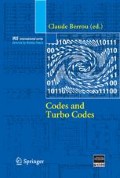Abstract
Because of the Gilbert-Varshamov bound, it is necessary to have long codes in order to obtain block codes with a large minimum Hamming distance (MHD) and therefore high error correction capability. But, without a particular structure, it is almost impossible to decode these codes.
Access this chapter
Tax calculation will be finalised at checkout
Purchases are for personal use only
Preview
Unable to display preview. Download preview PDF.
Bibliography
P. Adde, R. Pyndiah, and O. Raoul. Performance and complexity of block turbo decoder circuits. In Proceedings of Third International Conference on Electronics, Circuits and Systems, (ICECS′96), pages 172–175, Rhodes, Greece, 1996.
C. Berrou, A. Glavieux, and P. Thitimajshima. Near shannon limit error-correcting coding and decoding: turbo-codes. In Proceedings of IEEE International Conference on Communications (ICC′93), pages 1064–1070, GENEVA, May 1993.
J. Cuevas, P. Adde, and S. Kerouedan. Information theory turbo decoding of product codes for gigabit per second applications and beyond. European Transactions on Telecommunications, 17(1):345–55, Jan. 2006.
P. Elias. Error-free coding. IEEE Transactions on Information Theory, 4(4):29–39, Sept. 1954.
K. Farrell, L. Rudolph, C. Hartmann, and L. Nielsen. Decoding by local optimization. IEEE Transactions on Information Theory, 29(5):740–743, Sept. 1983.
A. Goalic, K. Cavalec-Amis, and V. Kerbaol. Real-time turbo decoding of block turbo codes using the hartmann-nazarov algorithm on the dsp texas tms320c6201. In Proceedings of International Conference on Communications (ICC′2002), New-York, 2002.
J. Hagenauer, E. Offer, and L. Papke. Iterative decoding of binary block and convolutional codes. IEEE Transactions on Information Theory, IT-42:429–445, 1996.
C.R.P. Hartmann and L.D. Rudolph. An optimum symbol-by-symbol decoding rule for linear codes. IEEE Transactions on Inforamtion Theory, IT-22:514–517, 1974.
A. Kothiyal and O.Y. Takeshita. A comparison of adaptative belief propagation and the best graph algorithm for the decoding of linear block codes. In Proceedings of IEEE International Symposium on Information Theory, pages 724–728, 2005.
R. Kotter and A. Vardy. Algebraic soft-decision decoding of reed-solomon codes. In Proceedings og IEEE International Symposium on Information Theory, page 61, 2000.
M. Lee and M. Kaveh. Fast hadamard transform based on a simple matrix factorization. IEEE Transactions on Acoustics, Speech, and Signal Processing, 34:1666–1667, 1986.
C.Y. Liu and S. Lin. Turbo encoding and decoding of reed-solomon codes through binary decomposition and self-concatenation. IEEE Transactions on Communications, 52(9):1484–1493, Sept. 2004.
L.E. Nazarov and V.M. Smolyaninov. Use of fast walsh-hadamard transformation for optimal symbol-by-symbol binary block-code decoding. Electronics Letters, 34:261–262, 1998.
R. Pyndiah, A. Glavieux, A. Picart, and S. Jacq. Near optimum decoding of product codes. In Proceedings of IEEE Global Communications Conference (GLOBECOM′94), San Francisco, 1994.
S. M. Reddy and J. P. Robinson. Random error and burst corrections by iterated codes. IEEE Transactions on Information Theory, 18(1):182–185, 1972.
N. Sendrier. Codes correcteurs à haut pouvoir de correction. PhD thesis, Université Paris VI, 1991.
V. Sorokine, F.R. Kschischang, and V. Durand. Trellis based decoding of binary linear block codes. Lecture Notes in Computer Science, 793:270–286, 1994.
M. Sudan. Decoding of reed-solomon codes beyond the error correction bound. Journal of Complexity, 12:180–193, 1997.
J. Wolf. Efficient maximum likelihood decoding of linear block codes using a trellis. IEEE Transactions on Information Theory, 24:76–80, 1978.
Editor information
Editors and Affiliations
Rights and permissions
Copyright information
© 2010 Springer-Verlag France, Paris
About this chapter
Cite this chapter
(2010). Turbo product codes. In: Berrou, C. (eds) Codes and Turbo Codes. Collection IRIS. Springer, Paris. https://doi.org/10.1007/978-2-8178-0039-4_8
Download citation
DOI: https://doi.org/10.1007/978-2-8178-0039-4_8
Publisher Name: Springer, Paris
Print ISBN: 978-2-8178-0038-7
Online ISBN: 978-2-8178-0039-4
eBook Packages: Computer ScienceComputer Science (R0)

